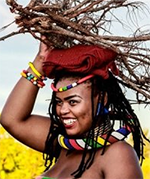It has been more than a year since the global scourge of Covid-19 struck, forcing the government and the private sector to scramble for vaccines and treatments to curb the spread of the virus. But what role have indigenous knowledge systems (IKS) played in curbing the pandemic?
This is what three IKS PhD candidates from the North-West University (NWU) explored in a recently published paper on the response of IKS to Covid-19. They are Simangaliso Lesley Mashego, Mothusiotsile Edwin Maditsi and Monicca Thulisile Bhuda.
The paper is titled “A response to Covid-19: perspective from African indigenous knowledge systems”.
Mothusiotsile says their main aim was to explore the contribution of African IKS to the development of a vaccine for Covid-19, and the existing therapeutics used by local communities in the management of the illness.
“This was done through a preliminary analysis of current literature published in scholarly journals,” he says.
Globally there are worries about equitable access to vaccines, particularly in poorer countries throughout the African continent. “This calls for these countries to look for alternative therapeutics through the collaboration of western-trained scientists and indigenous healthcare practitioners and knowledge holders,” says Mothusiotsile.
While a lot has been published on the possible contribution of traditional medicine across the globe, Mothusiotsile says little has been done to provide perspectives from African IKS.
Simangaliso points out that the involvement of traditional health practitioners has proven vital in the management of previous pandemics such as HIV/Aids, TB and malaria.
“Even though African traditional medicine is underdeveloped compared to Asian traditional medical systems, it has played a huge role in providing primary healthcare services. Therefore, it is vital to harness and develop the potential of indigenous healthcare systems to provide solutions to health challenges posed by the Covid-19 pandemic,” says Simangaliso.
In addition, the perceptions of African people towards western-manufactured vaccines are equally important in order to provide an understanding of the level of acceptance within African communities.
In conclusion, Simangaliso emphasises the need for research, development and innovation. “Even though Africa contributes 25% of the world’s biodiversity, only a few therapeutics have been developed and commercialised on the continent.”

Simangaliso Lesley Mashego

Mothusiotsile Edwin Maditsi

Monicca Thulisile Bhuda
